Muslim
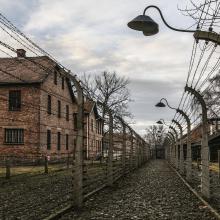
Auschwitz. Image via BeeZeePhoto / Shutterstock.com
Siavosh Derakhti, a young Swedish Muslim honored in Europe and the U.S. for his campaign to counter anti-Semitism, always explains his motivation by invoking David.
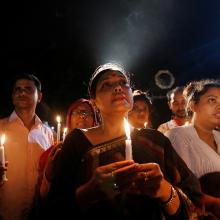
Image via REUTERS/Adnan Abidi/RNS
A vortex of hatred is sweeping across the globe, from a nightclub in Orlando to an airport in Istanbul to a restaurant in Dhaka.
At its center are individuals who wrap their savagery in the cloak of Islam. But these terrorists — perhaps 50,000 to 100,000 of the world’s 1.6 billion Muslims — are a perversion of the faith. They do not represent the Islam beloved by moderates like me.
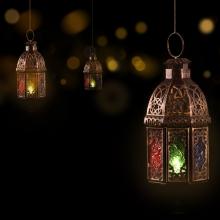
Image via wsantina/Shutterstock.com
I like to call Ramadan a personal spiritual boot camp. One not only fasts but also prays more, is more careful of one’s interactions with others, tries to exhibit more patience and love. The hunger and thirst — even the overall sense of exhaustion one feels by the end of each day — is a fuel that pushes a Muslim to do better, to fight the internal impulses towards negativity and sin, and to become a better person. Is that possible without fasting? Maybe. But with fasting it is definitely probable. By the end of the 30 days of Ramadan, one feels invigorated, nearer to God, and somehow optimistic.
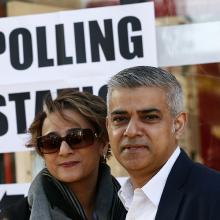
Sadiq Khan with his wife Saadiya. Image via REUTERS/Stefan Wermuth/RNS
Londoners have elected the son of a Pakistani-born London bus driver as their mayor, making him the first Muslim to govern this city of 8.5 million residents. Sadiq Khan, a 45-year-old Labour Party member, trounced his opponent, the Conservative Party’s Zac Goldsmith, 41, a well-known writer on ecological affairs and son of one of Britain’s wealthiest Jewish businessmen.

Photo via Fettullah OZASLAN / Shutterstock
IN FALL 1884, the congregation that became Temple Israel opened its doors as the first Jewish synagogue in the state of Nebraska. From its inception, Temple Israel was a Reform congregation, a theologically progressive denomination that stresses the social justice imperatives of Judaism. Yet the early members of Temple Israel included not just Reform Jews, but Conservative and Orthodox Jews as well; navigating these interdenominational relationships would prove to be a significant part of the congregation’s early development.
Fast forward 130 years and Temple Israel is one of three houses of worship embarking on a unique interfaith partnership: a single campus in west Omaha that will house a Jewish synagogue, a Muslim mosque, a Christian church, and a fourth building for interfaith fellowship.
Aryeh Azriel, Temple Israel’s senior rabbi, planted the seeds for this project, known as the Tri-Faith Initiative, in 2006 when he reached out to the American Muslim Institute, another local religious community that was looking to construct a new building.
“The original idea started as a result of looking for a partnership in sharing parking lots,” Azriel told Sojourners.
The two communities had forged a relationship in 2001 when, following the Sept. 11 attacks, Azriel led members of Temple Israel in encircling a local mosque to protect it from the Islamophobic attacks they were seeing in the national news.
Syed Mohiuddin, president of the American Muslim Institute, agreed to the partnership; he liked the idea of the two religious groups sharing a parking lot with each other rather than with retail stores or other commercial development. However, it didn’t take long for the two communities to realize the project had greater potential than a shared parking lot. If they could find Christians willing to join them, they could build a shared campus for all three Abrahamic faiths, the first such campus in the world—at least to their knowledge.
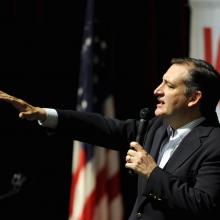
Image via REUTERS/Dave Kaup/RNS
Muslim groups say Sen. Ted Cruz and his Capitol Hill staff refused to see them during an annual lobbying day in which hundreds of Muslim constituents met with their senators and representatives.
On April 18, while Cruz was in New York, campaigning in advance of the April 19 presidential primaries in that state, a group of 14 Muslim Texans marking “National Muslim Advocacy Day” went to the candidate’s Washington office.

Image via Sean Pavone / Shutterstock.com
The largest gathering of Muslim leaders in the world kicks off a five-day conference that will call for a new peace process to end the Israeli-Palestinian conflict. Other weighty issues at the Organization of Islamic Cooperation summit include combatting extremism within Muslim nations, countering Islamophobia in the rest of the world, and protecting the Rohingya — a group of Muslims suffering persecution in Myanmar.
WHEN IT IS prayer time, Rami Nashashibi prays. His Muslim faith is the core of his life and work, inspiring the two decades of advocacy he has done on behalf of the poor and marginalized on the South Side of Chicago.
But when prayer time arrived on an unseasonably warm day in December, Nashashibi paused. It was just days after the terrible terrorist attack in San Bernardino, where extremists calling themselves Muslims murdered 14 people and injured many more. Nashashibi was in his neighborhood park with his three kids, and he found himself suddenly struck by fear at the thought of praying in public and therefore being openly identified as Muslim at a time when so many equated that term with terrorist.
That neighborhood park happened to be Marquette Park. Fifty years earlier another man of faith stood not far from where Nashashibi was standing, and he too felt fear. That man was Martin Luther King Jr. He had come to Chicago in 1966 to raise awareness about discriminatory housing practices on the South Side. His march through Marquette Park was met with racist sneers and vigilante violence. A brick thrown his way actually hit him in the head and brought him to his knees.
Martha DeVries. Screenshot via religionnews1 / Youtube
To protest the anti-Muslim rhetoric of this presidential campaign, high school counselor Martha DeVries decided to wear a hijab in public every Monday. DeVries, 47, attends a Baptist church and identifies as “a follower of Jesus,” but said she felt a responsibility to outwardly display her acceptance of Muslims and refugees.

Image via Igor Zh. / Shutterstock.com
It all began for me as a young girl, spending many childhood summers with my aunt — my father’s eldest sister. Her name was Hilal, which means “crescent moon” in Arabic. No name could have been more appropriate for her — just as the spiritual lives of Muslims center on the crescent moons of the lunar calendar, my family’s spiritual center stood upon this strong minded, faithful, and dedicated matriarch.

Image via REUTERS/Rebecca Cook/RNS
Catholic Charities is giving out water and food. The Flint Jewish Federation is collecting water and water filters. And the Michigan Muslim Community Council has distributed more than 120,000 bottles of clean water for Flint, Mich. But these faith organizations are also focused on a longer-term goal: to make sure the impoverished city, where President Obama last weekend declared a state of emergency over its poisoned water, is never so neglected again.

Image via wellphoto/Shutterstock.com
Rummana Hussain was one of those children whose Muslim parents envisioned her in a white coat with a stethoscope around her neck. Instead, she became a metro editor and reporter at the Chicago Sun-Times, where she covers criminal courts and remains the only Muslim member of the editorial staff. She knows “a couple” more Muslims at the Chicago Tribune, the state’s largest paper.

Bishop Philip Anyolo. Image via Fredrick Nzwili/RNS
A government plan to regulate religious groups is shaping into a bitter fight, with Christian and Muslim leaders protesting that it tramples over religious freedom. The government published a set of rules this month that require religious leaders to have theological degrees and religious groups to submit a statement of faith.
What do we lose when we trade our humanity for social stereotypes rationalized by religious dogma?
That question is at the heart of an ongoing discussion my son, a junior at Kenyon College, and I are having around the recent suspension of a tenured Wheaton College professor, Larycia Hawkins, for wearing a hijab during Advent and stating publicly (via her personal Facebook page) that Muslims and Christians worship the same god.
According to a recent poll by The Associated Press and the University of Chicago’s National Opinion Research Center, 82 percent said religious liberty protections were important for Christians, compared with around 60 percent who said the same for Muslims and the religiously unaffiliated.
Yet, religious freedom is not merely an important issue — it is our “first freedom.” What Americans, especially Christian Americans, must understand is this: Religious freedom for some is not religious freedom for long.

Image via REUTERS / James Akena / RNS
Francis marked the start of the jubilee on Dec. 8, when he opened the Holy Door at St. Peter’s Basilica in Rome. The yearlong celebration calls on Catholics to reflect on the theme of mercy and forgiveness and showcase a more inviting faith. That theme resonates in Africa, home to about 200 million Catholics. A sizable part of this population is tormented by war, violence from Muslim extremists, HIV/AIDS, and poverty.

Image via JPRichard/Shutterstock.com
I often find that the general public really has no idea that teachers are allowed to teach about the world’s religions in public schools. There’s a clear disconnect between what educators are doing and what the public thinks they can do. Then you add to this that people really don’t know that much about religions in general. The idea that a kid’s going to get converted by trying to write calligraphy, even if it’s a statement of faith — I mean, that seems like, really?
Following a surge of attacks on mosques and Muslims — a backlash against recent extremist attacks in Paris and San Bernardino — Islamic leaders have been installing more security cameras and hiring more security guards. But as they worry about the physical safety of their flocks, they are also paying attention to the spiritual damage Islamophobia can inflict.
Hate crimes penetrate Muslims deeply and widely, said Kameelah Rashad, Muslim chaplain at the University of Pennsylvania.
“It erodes their sense of identity and their sense of their spiritual selves,” she said.
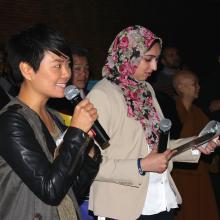
Image via Megan Sweas / RNS
After 9/11, Kathy Masaoka heard a Muslim woman on the radio describe her hesitancy to go to the market for fear of being attacked.
“It crystalized for me at that moment, that this must be how my parents felt and how my family felt after Pearl Harbor,” she said.
Masaoka’s family is Japanese American. As a young man during World War II, her father was drafted into the Military Intelligence Service while his parents and siblings were sent to California’s Manzanar internment camp in the desert east of the Sierra Nevada. They lost their family business in Los Angeles.

Image via REUTERS / Jonathan Alcorn / RNS
After the San Bernardino massacre, I, like other Muslims, worried about my safety.
I wondered what would happen if I went outside, given that I’m easily identifiable in my hijab. I wondered what that day, or the next or the day after that, would be like for me.
And that, I have decided, is ridiculous. I was not a victim that day.



